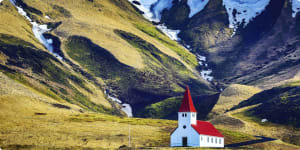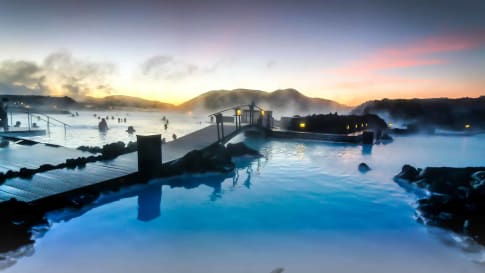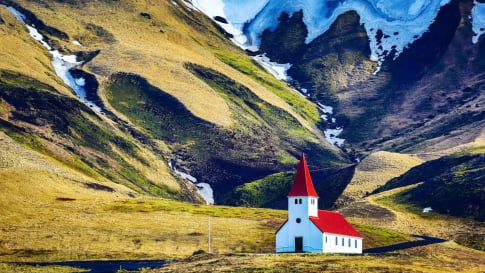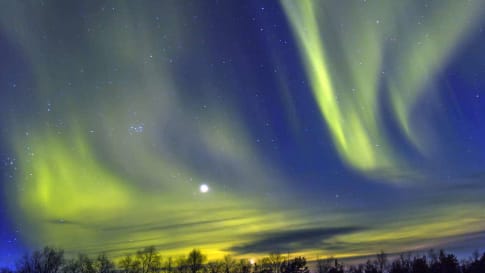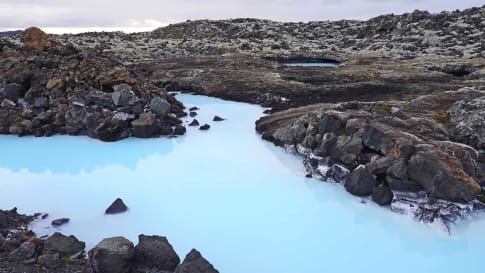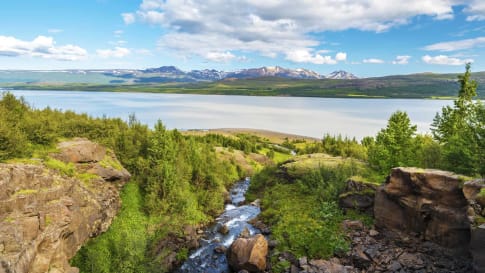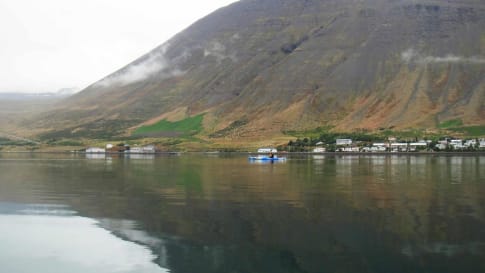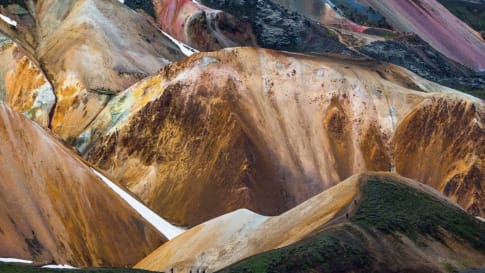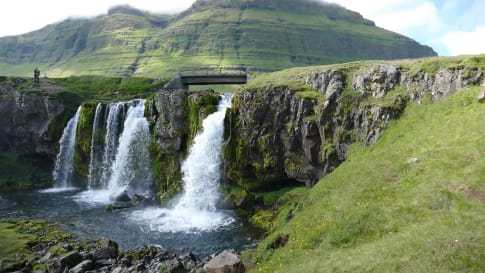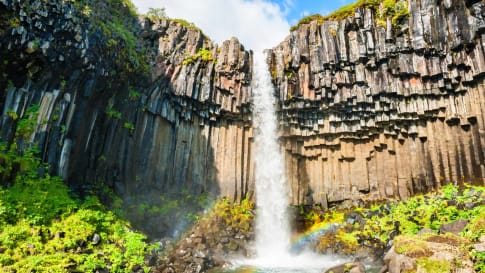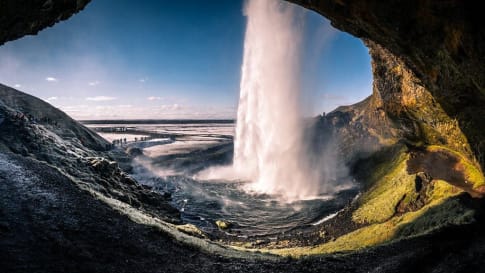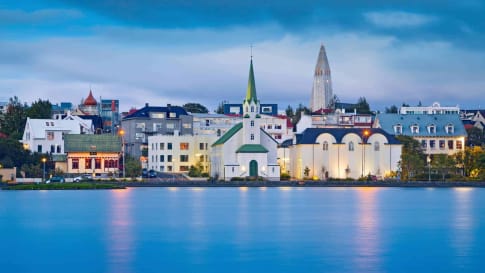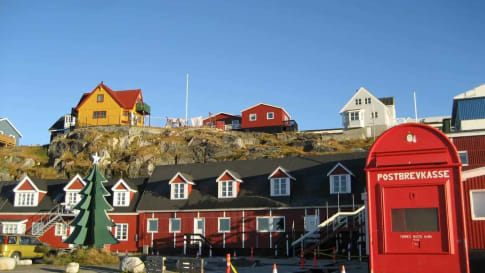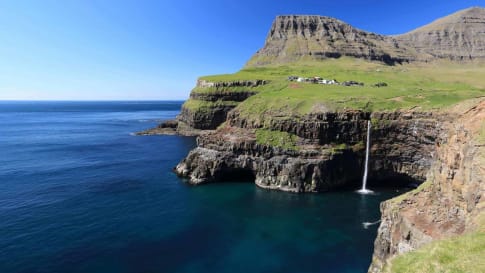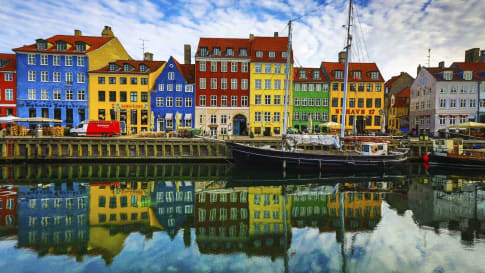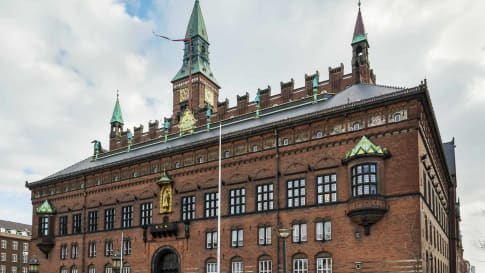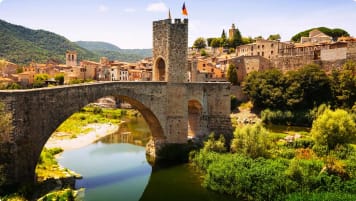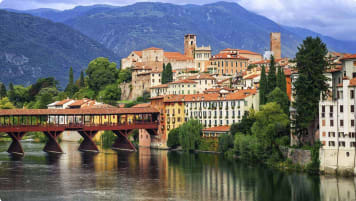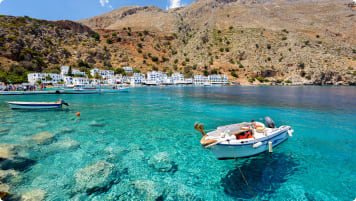Iceland cultural and wilderness small group tour
Our escorted tour gives guests an insight into the history of this Icelandic nation. Travelling as a small group, our daily itineraries explore the Jokulsarlon Glacier Lagoon and others, national parks and majestic waterfalls as we learn about Iceland’s natural heritage and its Viking past from experienced local guides. There is a single supplement for solo travellers.
This tour can be combined with 4 days in Greenland.
From $20,567NZD

Highlights
- 1. Visit the UNESCO World Heritage site of Thingvellir National Park.
- 2. Enjoy a bird watching cruise among the picturesque Breidafjordur Islands.
- 3. Experience Iceland’s spectacular glaciers, geysers, and waterfalls as you cruise among Arctic icebergs.
- 4. Take the opportunity to enjoy the Northern lights on our September departure.
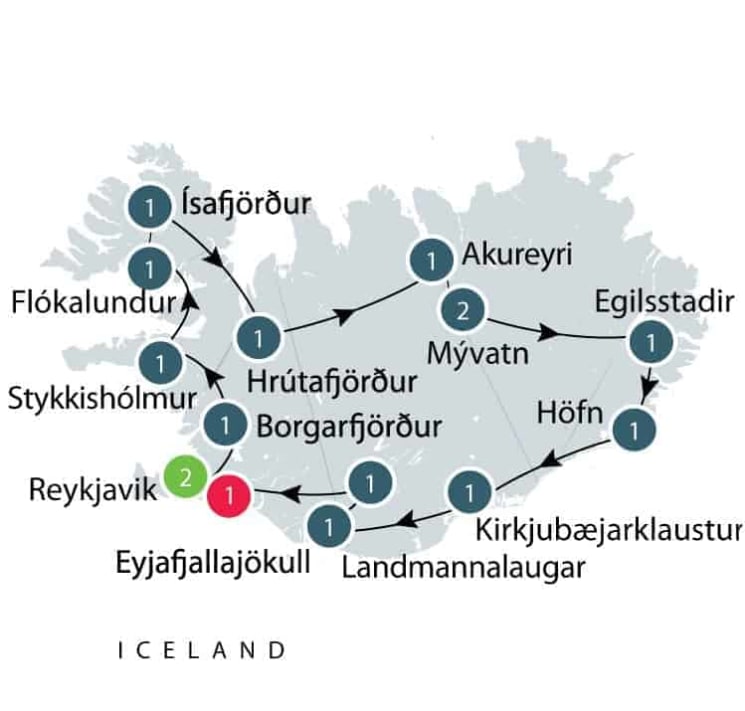
Departure Dates
| Departure Date | Price |
|---|---|
| 09 September 2025 Ends 25 September 2025 • 17 days $20,567 Twin $24,135 Single Available | Selected |
| 11 April 2026 Ends 27 April 2026 • 17 days $20,567 Twin $24,135 Single Available | |
| 07 September 2026 Ends 23 September 2026 • 17 days $20,567 Twin $24,135 Single Available |
Iceland Culture & Wilderness Small Group Tour
Odyssey offers easy, convenient, and relaxed escorted small group tours across Iceland and beyond. We explore Iceland’s world famous natural beauty, its ancient Viking heritage, World Heritage Sites, and charming Nordic towns, all with some truly spectacular scenery along the way. This and more is all waiting to be explored on one of Odyssey’s small group tours of Iceland, designed for the senior traveller, and led by experienced, and enthusiastic like minded people.
Odyssey’s Iceland cultural & wilderness small group tour for senior couples or solo travellers, is a 16-day circumnavigation of this fascinating island, designed for mature-aged or senior travellers. During this small group tour, we experience Iceland’s spectacular landscapes filled with glaciers, geysers, and waterfalls, as we cruise among Arctic icebergs at great destinations such as Vatnajokull National Park, Jokulsarlon Glacier Lagoon, and Snaefellsness National Park. Surrounded by natural wonders such as geysir, volcanic craters, and the famous Strokkur Geysir and Gulfoss Waterfall, we will also go whale watching in the fishing village of Husavik. At Illugastadir we will spot seals from the coast. If you are travelling on a September departure to Iceland with Odyssey Traveller, you may even be in luck to see the Northern Lights.
Our fully escorted guided tours offer fresh insights into the history of Iceland, from settlement to the present day as we follow Iceland's Golden circle, with the help of an Odyssey Program Leader and local tour guides.
This tour can be combined with our 4 days in Greenland.
Iceland Small Group Tour Itinerary for seniors.
Iceland’s climate, dramatic geological activity, and unique history provide visitors with amazing landscapes and experiences. Together, we learn about Iceland's flora and fauna, as well as its Viking past as well as the role in the exploration and settlement of the Atlantic.
Our Iceland small group tour begins in the south coast, in the nation’s historic and charming capital, followed by trips from Reykjavik. We begin by enjoying a morning lecture on contemporary Iceland, followed by a field trip to explore the icons of the city. We stop at Perlan (The Pearl) where we enjoy an excellent panoramic view of the whole city. Afterwards, we visit the National Museum of Iceland. Here, we gain new insights into the history of the Icelandic nation from its settlement to the present day. Later on, we head to the Blue Lagoon, where we experience the naturally warm baths before returning to Reykjavik.
Reyjkavik
Reykjavik is a city full of surprises and contradictions. It is the capital city but not much bigger than a small town. Physically remote from the rest of the world, it has modern technology right at its heart. In winter, the city is scoured by blizzards and experiences never-ending night, but in summer, the streets are washed with 22 hours of daylight. When Iceland came under Danish rule, Reykjavik was designated as the administrative centre in 1786, and seat of parliament in 1843. When Iceland transitioned to self-rule (and later, to an independent republic), the city served as its capital.
As the capital and largest city of Iceland, Reykjavik will most likely be your first port of entry into this fairly isolated island country. Iceland’s nearest neighbour in Europe is Scotland, lying 800 kilometres (500 miles) away. It takes roughly five hours to fly to Reykjavík from New York, and three hours from London. Home to 40 percent of Iceland’s total population, Reykjavik is a colourful capital city not much larger than a small town. Perched on the country’s rugged coastline, the city is proud of its natural setting and striking architecture and thrilling culture.
The city is the location of the Keflavik International Airport, and is Iceland’s commercial, industrial, and cultural centre. Popular among tourists, Reykjavik, in addition to its art galleries and natural wonders, is also renowned for its nightlife, with its numerous restaurants, bars, and clubs. We will visit the Old Harbour area, once a service harbour that is now a cosmopolitan tourist attraction, and experience a walking history tour of Old Reykjavik in the city centre. Its Harpa Concert Hall and Conference Centre, with its striking honeycomb design, has won the prestigious Mies Van der Roe architectural award. The National Museum contains artefacts that tell the story of Iceland’s history. View the eye-catching Lutheran church, Hallgrímskirkja, a place of worship for most Icelanders, as a huge majority (80%) are members of the Lutheran State Church.
Other Highlights
One of the highlights of our Iceland cultural and wilderness tour is a visit to UNESCO World Heritage listed Thingvellir National Park, part of Iceland's Golden Circle. We also enjoy a bird-watching cruise among the picturesque Breidafjordur Islands. In addition, we have the opportunity to meet the locals in many towns and hamlets, and savour many Icelandic delicacies.
Our Iceland cultural and wilderness tour is designed for the mature couple or single traveller interested in discovering the many facets of Iceland. As such, the tour is fully escorted, with local guides providing deep insights into the history, culture, including the Vikings, geomorphology, and wildlife of this remote country. You can start expanding your knowledge by reading our country profile on Iceland or articles about why Iceland is the best place in the world to be a woman, and what can we learn about happiness from Iceland.
As an extension to the Iceland Small Group Tour, Odyssey offers a tour to Greenland, under the name Discover Greenland.
For more details about this tour, click the ‘Top 5’ or ‘Itinerary’ buttons above! If you’re keen to experience this tour, please call or send an email. Or, to book, simply fill in the form on the right hand side of this page.
This tour can be combined with our 4 days in Greenland tour.
Gallery
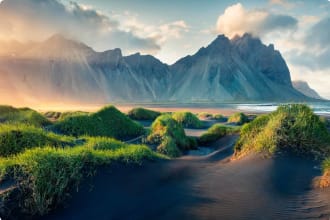
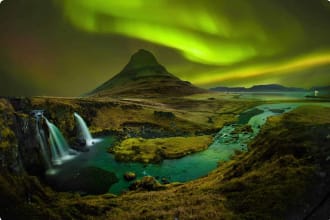
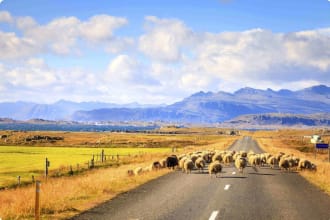
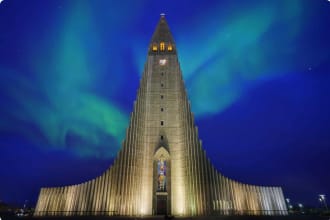
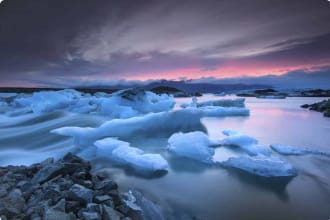
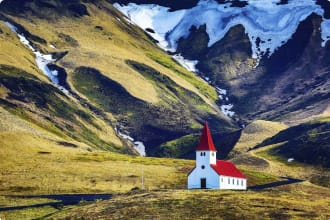
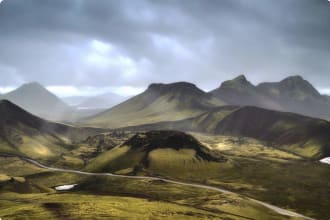
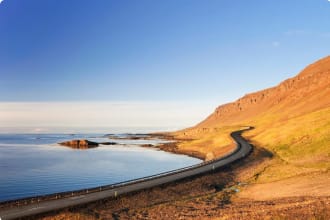
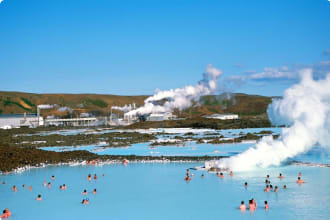
Itinerary
17 days
Day 1: Reykjavík
Accommodation: Hotel Reykjavik Natura or similar
We will enjoy a welcome dinner in Reykjavík, followed by a briefing by local guide.
Day 2: Reykjavík - Blue Lagoon
Accommodation: Hotel Reykjavik Natura or similar
A morning lecture on contemporary Iceland is followed by a field trip to explore the icons of the city. We stop at Perlan (The Pearl), where we enjoy an excellent panoramic view of the whole city. We also visit the National Museum of Iceland, which will give us insight into the history of the Icelandic nation from its settlement to the present day. In the afternoon we head to the Blue Lagoon to experience the naturally warm baths famous in Iceland. The lagoon is rich in silica and said to be good for the skin. We return to Reykjavik, Iceland’s historic and charming capital, and the rest of the evening is at leisure.
Reykjavik is a place full of surprises and contradictions. It is a capital city but not much bigger than a small town, a city remote from the world but, with modern technology, right at its heart. In fact it is known as one of the party capitals of the world where there is a sense of things happening! The city combines colourful buildings with quirky people and a capricious soul. In winter the city is scoured by blizzards and doused in never-ending night, but in summer the streets are washed with 22 hours of daylight. Reykjavik is a city that treasures its Viking past but lives for the present and the future. We explore the stark white Hallgrims Church, the old Parliament, the bright modern city hall and visit the impressive Museum of Iceland which traces the history of the country with fascinating displays.
Day 3: Thingvellir National Park – Borgarfjordur
Accommodation: Icelandair Hotel Hamar or similar.
We leave Reykjavik and head to Thingvellir National Park, designated a UNESCO World Heritage site. This is the former site of the world’s oldest parliament and is an excellent location to learn about the movement of the earth’s continental plates and to see how that movement affects Iceland today. From the National Park, we drive to the Borgarfjordur region, visiting the Hraunfossar waterfalls where the water seems to emerge from beneath a 1000 year old lava field. We pause at the Deildartunguhver hot springs, from which the local farms and villages obtain their hot water and heat their houses. We visit Reykholt, the homestead of the famous Saga writer, Snorri Sturluson, where we have a lecture on Snorri Sturluson, the Middle Ages & the Struggle for Independence. We stay 2 nights in the Borganfjordur Region.
Day 4: Snaefellsnes Peninsula
Accommodation: Hotel Stykkishólmur or similar.
Today’s full day field trip takes us to the Snaefellsnes Peninsula, which is dominated by the Snaefellsjokull glacier, where according to Jules Verne‘s book “the entrance to the centre of the earth” can be found. We meet farmer Hildibrandur at Bjarnarhofn farm and visit his tiny wooden church and get a taste of his special Icelandic delicacy, shark meat. We also pass through small fishing villages as we circumvent the peninsula and pause in the bay at Djupalonssandur to view the unique Londrangar cliffs and the picturesque village of Arnarstapi. This evening there is a display of local folk music and dancing at our hotel.
Day 5: Stykkisholmur – Brjanslaekur- Flokalundur
Accommodation: Hotel Flokalundur or similar.
This morning we travel to the village of Stykkisholmur for a short bird watching cruise among the picturesque Breidafjordur islands, before continuing our journey north and embarking on the afternoon ferry to Brjanslaekur on the southern part of the Westfjords. We stay overnight at the tiny village of Flokalundur.
Day 6: Latrabjarg- Isafjordur
Accommodation: Hotel Ísafjörður or similar.
This morning we drive to Latrabjarg, the most westerly point of Europe, where we view the the longest cliff in Europe, and catch a glimpse of some of the millions of seabirds which it hosts. From Latrabjarg we continue to Isafjordur town, the capital of the Westfjords, an area of majestic mountains and deep blue fjords. Our journey takes us over Dynjandisheidi mountain pass with a stop at the Dynjandi waterfall in Arnarfjordur, the largest waterfall of the Westfjords. We than travel to the village of Flateyri on the fjord of Onundarfjordur, and just before arriving in Isafjordur (population of just 4000) we pass the Westfjords tunnel. We overnight in dramatic and historic Isafjordur.
Day 7: Isafjordur – Hrutafjordur
Accommodation: Hotel Gauksmýri or similar.
This morning we visit the cultural museum to learn about the interesting history of Isafjordur and the life of its inhabitants. From Isafjordur we drive along the impressive fjord of Isafjardardjup which is in turn intersected by numerous smaller fjords and pass over the mountain road of Steingrimsfjardarheidi from where there is a stunning view of the surrounding mountains and fjords. Our journey continues past the fishing village of Holmavik and then via Steingrimsfjordur fjord to our overnight in the Hrutafjordur area.
Day 8: Hrutafjordur –Vatnsnes- Akureyri
Accommodation: Kea Hotel Akureyri or similar.
From Hrutafjordur we drive to the Vatnsnes Peninsula which is home to one of the largest seal colonies in Iceland. Our first stop is at Illugastadir where seals can be spotted from the coast. We then continue to Hvitserkur, a huge sea-eroded cliff rising 15 metres from the ocean, and then to the Skagafjordur region, renowned for horse breeding. We visit the fascinating farmhouse museum at Glaumbaer before continuing over the Oxnadalsheidi mountain pass into Akureyri, the bustling second largest city in Iceland. There is a short guided visit to Akureyri before arriving at our hotel in Eyjafjordur region for an overnight stay and a lecture on the geology of Iceland.
Day 9: Godafoss– Lake Myvatn
Accommodation: Selhotel Myvatn or similar.
Today we continue our journey towards Lake Myvatn. En route we visit Godafoss, the “Waterfall of the Gods” and we spend the remainder of the day exploring Lake Myvatn. Here we experience some of the area’s impressive geological phenomena including pseudo craters at Skutustadir, lava sculptures at Dimmuborgir (Dark Castles), and bubbling mud pools at Namaskard. We also pause at the explosive crater Viti (Hell) from the late 18th century and (volcanic activity permitting!) walk in the Leirhnjukur volcanic area and its lava field (where eruptions took place between 1975 and 1984). The lake area is also of worldwide renown for its rich bird life, especially the many species of duck breeding by the lake. We visit Sigurgeir’s bird museum, the largest private bird collection in Iceland, before checking in at our hotel in the Lake Myvatn area for a 2 night stay.
Day 10: Whale watching at Husavik - Jokulsargljufur National Park
Accommodation: Selhotel Mývatn or similar
We will take a full day’s field trip today as we drive to the fishing village of Husavik from where we take a boat to try and spot some of the many whales which pass the Icelandic shores. The afternoon is spent in the Jokulsargljufur National Park where we visit Asbyrgi, the horseshoe-shaped canyon, which according to legend was formed by the hoof of Odin‘s horse Sleipnir. We also pause at Hljodaklettar to experience the strange acoustics of the rock.
Day 11: Myvatn – Egilsstadir
Accommodation: Icelandair Hotel Hérað or similar.
Today we cross the highland desert of Modrudalsoraefi to Egilsstadir. En route we take a detour to discover the powerful Dettifoss waterfall and once we arrive in Egilsstadir, the largest town of Eastern Iceland, we explore scenic Lake Logurinn. The lake is Iceland’s third largest lake, beautifully scenic but, according to the Sagas, home to a legendary monster. We also drive through the largest forest of Iceland, Hallormsstadaskogur, and view the picturesque waterfall of Hengifoss, Iceland‘s second highest, before staying overnight in Egilsstadir.
Day 12: Egilsstadir –East fjords –Hofn
Accommodation: Hotel Höfn / Waitlist Fosshotel Vatnajökull or similar.
Our journey traverses Eastern Iceland where we pass through typical fishing villages and where we visit the mind-boggling Rock & Mineral Collection of Petra Sveinsdottir in Stodvarfjordur. As we descend to Hofn on Hornafjordur we catch a magnificent view of the largest glacier in Iceland, Vatnajokull. We spend the night in a country hotel beneath the glacier and explore the Vatnajokull glacier, the biggest ice cap in Europe, by special jeep.
Day 13: Jokulsarlon – Skaftafell –Kirkjubaejarklaustur
Accommodation: Icelandair Hotel Kirkjubæjarklaustur or similar.
Our first stop today is at Jokulsarlon glacier lagoon where we take a short boat ride among icebergs in the lagoon before continuing to the Skaftafell National Park where we spend some time walking among the glaciers. We then drive over the sands to Kirkjubaejarklaustur area for our overnight stay.
Day 14: Kirkjubaejarklaustur –Dyrholaey – Eyjafjallajokull Volcano Region
Accommodation: Hotel Skógar or similar.
From Kirkjubaejarklaustur we head west over the black sands of Myrdalssandur to the tiny green village of Vik. We pause to view the cliffs at Dyrholaey, which is a paradise for bird watchers but closed to visitors during the nesting season from early May to late June, and explore the area close to the volcano Eyjafjallajokull, visiting the fascinating folk museum and the dramatic Skogafoss waterfall at Skogar river. Here we will spend the night.
Day 15: Landmannalaugar highlands
Accommodation: Icelandair Hotel Flúðir or similar.
Today we meet local farmers at Asolfsskali and hear about what effects the eruption in March/April 2010 had on their farm life before heading to the Icelandic highlands.
Today’s field trip takes us to the interior and to Landmannalaugar with its many colored rhyolite mountains and obsidian lava field. Throughout the summer, it is one of the most popular places for hiking – either over one day or several – and for natural hot spring bathing. We’ll enjoy one of the short/moderate hikes, taking approximately 2h in total.
We’ll also visit Lava Centre, an interactive educational exhibition revealing the science and aesthetics of Iceland‘s spectacular geological features.
Day 16: Gullfoss waterfall and Geyser hot spring area
Accommodation: Hotel Reykjavik Natura or similar.
We commence our journey today with a visit to a horse and tomato farm at Fridheimar. Here we learn about farming in this inhospitable terrain as we enjoy a short show by Icelandic horses and learn how fruit and vegetables are grown in Iceland’s short growing season, peeking into their greenhouses and tasting the delicious tomatoes cultivated with geothermal energy the whole year round. After our farm visit we continue to Gullfoss, “The Golden Waterfall,” a hugely powerful and beautiful waterfall that plunges in 2 stages into a drift valley and also experience Iceland’s famous geothermal area where we see the active Strokkur Geyser bursting forth every few minutes in a cloud of steam. We learn how Icelanders capture this geothermal power at the Hellisheidi power plant before return to Reykjavik for our farewell dinner and last overnight in Iceland.
Day 17: Reykjavík
Our tour ends in Reykjavík.
Tour Notes
- Group size is limited to 18 travellers
Includes / Excludes
What’s included in our Tour
- 16 nights of hotel accommodation.
- 16 breakfasts and 12 dinners.
- Transport in comfortable and modern coaches with a driver guide.
- All excursions, entrance fees as per itinerary.
- Services of a Tour Leader for the duration of tour.
- Service charges and gratuities.
- Detailed preparatory information.
What’s not included in our Tour
- International airfares and departure taxes.
- Comprehensive travel insurance.
- Items of a personal nature such as telephone calls and laundry.
Participants must be able to carry their own luggage, climb and descend stairs, be in good health, mobile and able to participate in 3-5 hours of physical activity per day, the equivalent of walking / hiking up to 8 kilometers per day on uneven ground.
Book now
Make it a private tour
Easing your journey
Crossing international borders with restrictions
The list of requirements to travel internationally has changed and will continue to change for several years. Odyssey is here to assist you in managing your way through these requirements:
For more information see our Crossing international borders with restrictions page.
Book With Confidence
If less than 30 days before your tour starts you are unable to travel as a result of Government travel restrictions, Odyssey Traveller will assist you with a date change, provide you with a credit or process a refund for your booking less any non-recoverable costs.
See Terms and conditions for details.
Peace of Mind Travel
The safety of our travellers, tour leader, local guide and support staff has always been our top priority and with the new guidelines for public health and safety for keeping safe for destinations around the world, we’ve developed our plan to give you peace of mind when travelling with us.
See Peace of Mind Travel for details.
Reviews
The geographical wonders offered by Iceland and Greenland left me in awe. The grandeur and spectacle of the countryside is breathtaking. Our leader (Rob) was excellent: well-researched, friendly, organized and good-humoured.
Participant 2017
It is hard to believe that such a small country can contain so much dramatic scenery. Icecaps and glaciers, huge waterfalls, volcanos and hot bubbling mud, and those wonderful fjords and high mountain passes
Participant 2016
Our guide was a great ambassador for his country, wide knowledge of literature, history, customs, industry, fishing - also a perceptive and sensitive person who inter-acted so willingly with all of us!
Participant 2016
Every day was different with so much to see and do. Volcanoes, craters (including the pseudo ones), bubbling mud pools, and the active Strokkur Geyser, the bird life, black sand beaches, and those beautiful Icelandic horses. The time flew by...
Participant 2016
I loved this trip as it was so very different from anywhere else I've been. The scenery was breath-taking and I never imagined I'd be taken on a cruise around a lagoon filled with icebergs, or see so many magnificent waterfalls that I lost count.
Participant 2016
Reading List Download PDF
The History of Iceland
Gunnar Karlsson
Iceland is unique among European societies in having been founded as late as the Viking Age and in having copious written and archaeological sources about its origin. Gunnar Karlsson, that country's premier historian, chronicles the age of the Sagas, consulting them to describe an era without a monarch or central authority. Equating this prosperous time with the golden age of antiquity in world history, Karlsson then marks a correspondence between the Dark Ages of Europe and Iceland's "dreary period", which started with the loss of political independence in the late thirteenth century and culminated with an epoch of poverty and humility, especially during the early Modern Age.
Iceland's renaissance came about with the successful struggle for independence in the nineteenth and early twentieth centuries, and with the industrial and technical modernization of the first half of the twentieth century. Karlsson describes the rise of nationalism as Iceland's mostly poor peasants set about breaking with Denmark, and he shows how Iceland in the twentieth century slowly caught up economically with its European neighbors.
The Sagas of Icelanders
Various
A unique body of medieval literature, the Sagas rank with the world's greatest literary treasures--as epic as Homer, as deep in tragedy as Sophocles, as engagingly human as Shakespeare. Set around the turn of the last millennium, these stories depict with an astonishingly modern realism the lives and deeds of the Norse men and women who first settled Iceland and of their descendants, who ventured further west--to Greenland and, ultimately, the coast of North America itself.
The ten Sagas and seven shorter tales in this volume include the celebrated "Vinland Sagas," which recount Leif Eiriksson's pioneering voyage to the New World and contain the oldest descriptions of the North American continent.
For more than seventy years, Penguin has been the leading publisher of classic literature in the English-speaking world. With more than 1,700 titles, Penguin Classics represents a global bookshelf of the best works throughout history and across genres and disciplines. Readers trust the series to provide authoritative texts enhanced by introductions and notes by distinguished scholars and contemporary authors, as well as up-to-date translations by award-winning translators.
The Vikings: A History
Robert Ferguson
A comprehensive and thrilling history of the Vikings for fans of the History Channel series, now on its fourth season.
From Harald Bluetooth to Cnut the Great, the feared seamen and plunderers of the Viking Age ruled Norway, Sweden, and Denmark but roamed as far as Byzantium, Greenland, and America. Raiders and traders, settlers and craftsmen, the medieval Scandinavians who have become familiar to history as Vikings never lose their capacity to fascinate, from their ingeniously designed longboats to their stormy pantheon of Viking gods and goddesses, ruled by Odin in Valhalla. Robert Ferguson is a sure guide across what he calls "the treacherous marches which divide legend from fact in Viking Age history." His long familiarity with the literary culture of Scandinavia with its skaldic poetry is combined with the latest archaeological discoveries to reveal a sweeping picture of the Norsemen, one of history's most amazing civilizations.
Impeccably researched and filled with compelling accounts and analyses of legendary Viking warriors and Norse mythology, The Vikings is an indispensable guide to medieval Scandinavia and is a wonderful companion to the History Channel series.
Why Iceland?: How One of the World's Smallest Countries Became the Meltdown's Biggest Casualty
Asgeir Jonsson
As late as the mid 1980s, Iceland’s economy revolved around little else than a semi-robust cod-fishing industry. By the end of the century, however, it had transformed itself into a major player in world finance, building an international banking empire worth twelve times its GDP. The tiny island nation of 300,000 was one of the global economy’s great success stories.
And then everything came crashing down.
Why Iceland? is the inside account of one of the economic meltdown’s most fascinating and far-reaching tragedies. As Chief Economist of Kaupthing Bank, the country’s largest bank before the collapse, Ásgeir Jónsson is perfectly suited to examine Iceland’s collapse in painstaking detail. He witnessed behind-the-scenes events firsthand, such as an intriguing meeting in January 2008 when a group of international hedge fund managers gathered in a bar in Reykjavik to discuss Iceland’s economy―an informal affair that eventually became the center of a criminal investigation by the country’s Financial Supervisory Authority.
This inside account examines the pressing issues behind history’s biggest banking collapse:
How did Iceland transform itself from one of Europe’s poorest to one of its wealthiest countries?
What happened to cause the destruction of the nation’s banking industry during a single week of October 2008?
Was it the result of a speculation “attack” by hedge funds on the nation’s currency?
Iceland remains the biggest casualty of the economic downturn, and the ramifications of its catastrophic failure reach deeply into the economies of Europe, the United States, and other global markets. Ásgeir Jónsson offers a unique perspective and an expert’s insight into the rise and fall of this once-proud banking giant.
Why Iceland? provides the who, what, where, and when of Iceland’s demise, serving as a fascinating read and providing the understanding necessary for forecasting when and where the aftershocks will shake up markets in other parts of the world.
Wasteland with Words: A Social History of Iceland
Sigurður Gylfi Magnússon
Iceland is an enigmatic island country marked by contradiction: it’s a part of Europe, yet separated from it by the Atlantic Ocean; it’s seemingly inhospitable, yet home to more than 300,000. Wasteland with Words explores these paradoxes to uncover the mystery of Iceland.
In Wasteland with Words Sigurdur Gylfi Magnússon presents a wide-ranging and detailed analysis of the island’s history that examines the evolution and transformation of Icelandic culture while investigating the literary and historical factors that created the rich cultural heritage enjoyed by Icelanders today. Magnússon explains how a nineteenth-century economy based on the industries of fishing and agriculture—one of the poorest in Europe—grew to become a disproportionately large economic power in the late twentieth century, while retaining its strong sense of cultural identity. Bringing the story up to the present, he assesses the recent economic and political collapse of the country and how Iceland has coped. Throughout Magnússon seeks to chart the vast changes in this country’s history through the impact and effect on the Icelandic people themselves.
Up-to-date and fascinating, Wasteland with Words is a comprehensive study of the island’s cultural and historical development, from tiny fishing settlements to a global economic power.
The Almost Nearly Perfect People: Behind the Myth of the Scandinavian Utopia
Michael Booth
The Danes are the happiest people in the world, and pay the highest taxes.
'Neutral' Sweden is one of the biggest arms manufacturers in the world.
Finns have the largest per capita gun ownership after the US and Yemen.
54 per cent of Icelanders believe in elves.
Norway is the richest country on earth.
Michael Booth has lived among the Scandinavians, on and off, for over ten years, perplexed by their many strange paradoxes and character traits and equally bemused by the unquestioning enthusiasm for all things Nordic and hygge that has engulfed the rest of the world.
He leaves his adopted home of Denmark and embarks on a journey through all five of the Nordic countries to discover who these curious tribes are, the secrets of their success and, most intriguing of all, what they think of each other. Along the way a more nuanced, often darker picture emerges of a region plagued by taboos, characterised by suffocating parochialism and populated by extremists of various shades.
Names for the Sea: Strangers in Iceland
Sarah Moss
Sarah Moss had a childhood dream of moving to Iceland, sustained by a wild summer there when she was nineteen. In 2009, she saw an advertisement for a job at the University of Iceland and applied on a whim, despite having two young children and a comfortable life in Kent. The resulting adventure was shaped by Iceland’s economic collapse, which halved the value of her salary, by the eruption of Eyjafjallajokull and by a collection of new friends, including a poet who saw the only bombs fall on Iceland in 1943, a woman who speaks to elves and a chef who guided Sarah’s family around the intricacies of Icelandic cuisine. Names for the Sea is her compelling, beautiful and very funny account of living in a country poised on the edge of Europe, where modernisation clashes with living folklore.
